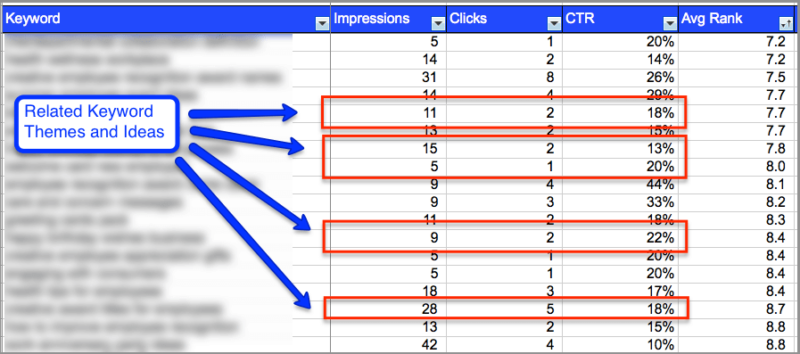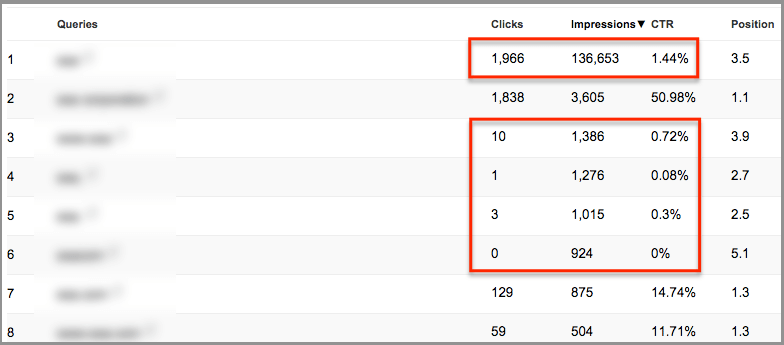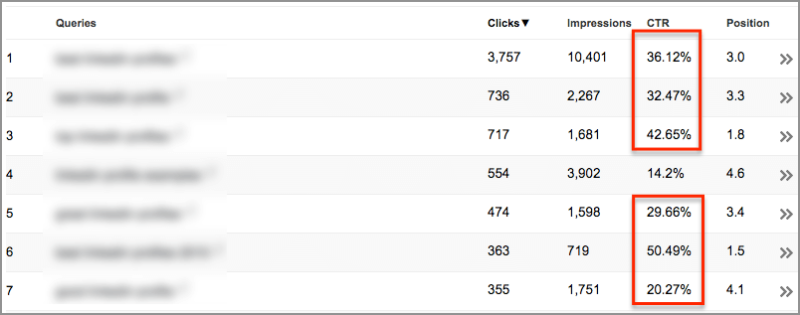How To Uncover SEO Content Marketing Ideas With Google Search Analytics
Columnist Derek Edmond explains how to use data from Google Search Console to inform ongoing content marketing initiatives for greater search engine visibility.

When Google first launched Webmaster Tools (now known as Google Search Console), I was more than skeptical of its value. I had a hard time buying into XML sitemaps as a must-have SEO asset, and the original results for keyword data were never close to what could be found in web reporting tools.
Fast forward to the new year, and we all know Google Search Console has evolved significantly. One of the key areas where the platform has become essential is in the Search Analytics dashboard.
With nearly all organic keyword data blocked due to “not provided,” this dashboard has become more important in helping SEO campaign management.
And while Search Analytics data is still not reliable for connecting individual keywords to direct leads, the opportunity to build out content marketing campaigns through keyword research is significant.
In this column, I am going to showcase three tactical applications of Search Analytics data analysis that can be applied to make more meaningful, SEO-centric content marketing decisions.
Search Analytics Overview
Per Google help reference, the Search Analytics Report shows how often a website appears in Google search results. Information provided can be filtered and grouped by categories such as search query, date or device.
By default, the Search Analytics Report shows top keywords, based on clicks to the website, over a four-week period.
While this information is interesting, when marketers integrate additional parameters and manipulate the data-based comparisons, keyword insight actually becomes actionable.
A few key recommendations for enabling actionable insight from search analytics data:
- Obtain all information possible (Clicks, Impressions, CTR, Position).
- Consider filtering based on search type (the default is “Web”).
- Assuming you’re in it for the “long haul,” periodically download ALL available information, since Google only keeps 90 days’ worth of keyword information accessible to site owners.
For the scenarios below, we also export a month’s worth of search analytics data, including clicks, impressions, CTR and average position, for use in spreadsheet format.
From there, we use spreadsheet filters and sorting functions to focus on specific subsets of information that are designed to develop SEO-centric content marketing recommendations.
Tactic: Build On Developing Success
One of the first patterns to look for are keywords that have a higher-than-average click-through rate (CTR), based on moderate to even low impressions, but an average position towards the bottom of the first page or into the second page of search engine results.
A higher-than-average click-through rate suggests that content associated with our website is relevant and that searchers will dig deeper to find good results.
When manipulating these data in spreadsheet format, here are suggested filters that we used in developing tactical recommendations.
Suggested Spreadsheet Filters:
- At least five search impressions in a given month.
- 10 percent CTR or greater, but 20 percent CTR if the keyword was associated to just one click.
- Average position between seven and 12 (lower half of first page or on the second page of organic search results).
While there are a few different directions one could take when reviewing results from this data set, we specifically look for a pattern in the similarity of keywords present and cross-reference existing search results to confirm opportunity specific to content marketing development.
For SEO-centric content marketers, the expected outcome is to uncover keyword themes that can be incorporated into new blog posts and articles or to develop keyword-specific topical recommendations for writing teams.
Tactic In Action
We used this type of keyword analysis for one of our clients and helped guide monthly blog post development and topical recommendations for internal content marketing teams.
Over the course of 2015, we realized over 200 percent improvement in organic search performance. These results were closely tied to the ongoing content development executed with this keyword analysis in hand.
The key to success was in defining keyword-based recommendations that were as actionable as possible. This meant reviewing existing search engine results, based on the direction gleaned from search analytics data, that primarily included articles, bylines and blog posts that were more closely aligned to the scope and reach of our program.
Tactic: Explore New, More Popular (But Competitive) Themes
For this type of Search Analytics-based initiative, we are looking for keyword opportunities in which the website ranks well and search impressions are significant, but click-through rates on our results are poorer than one would expect.
This leads to a couple of initial considerations to explore. Either we’re not providing good enough copy and tagging to influence click-through rates or our result is not really applicable to the keyword being searched.
Suggested Spreadsheet Filters:
- Search impressions in excess of 500 per month.
- Average Position greater than 5 (or potentially halfway up the first page of results).
- CTR less than five percent.
The one important area of concern in this type of analysis is that even though we’re attempting to look at web page results only, Google will often include image-based rankings in this data set, as well. As a result, it’s important to manually review search engine results and confirm if this is the case.
Tactic In Action
The most actionable recommendation from this endeavor is the optimization of HTML Title Tags, meta descriptions and more for related content marketing assets.
While executing these types of recommendations is a very good idea, the concern is that tagging alone will not generate measurable results.
The more strategic opportunity is in the reassessment of existing search results to come up with recommendations that help redefine content marketing focus. Here are two recent program examples:
- In one scenario, we realized that not all of an organization’s brand-specific results were yielding a significant percentage of organic search traffic. The recommendation has been to further develop brand-based content marketing assets, in an effort to better align with search intent.
- In another scenario for a large e-commerce distributor, we realized that the competitive landscape for a particular set of keywords was beginning to get too crowded with major online retailers. This has led to our focus shifting to different product lines and more specific, but related, keyword targets.
Aside from the obvious differences in keyword behavior, the one challenge to content marketing worth noting is that we’re often making recommendations that require a higher level of investment — either in complexity, time or financial resources.
Tactic: Augment What’s Already Worked Well
Arguably the most rewarding tactic to consider. In this scenario, we’re analyzing keyword performance to find already successful topics that can be leveraged in complementary ways.
The assumption to begin with is that we will be better able to leverage past success by creating related keyword-based concepts, short-term and long-term.
Suggested Spreadsheet Filters:
- Search impressions in excess of 100 per month.
- CTR greater than 10 percent.
- Average position greater than 5 (or potentially halfway up the page).
Because these keywords already perform “well,” recommendations could include both tactical ideas (like articles, blog posts and landing pages) and more long-term strategic initiatives (brand development, comprehensive research and so on).
Tactic In Action
In one client program, we noticed that a particular keyword theme resonated well with searchers and also showed consistently strong search impressions.
Based on this information, we crafted a series of a series of more comprehensive content marketing assets that were designed to complement and improve performance for this keyword theme.
Here are the results over the past year, which show consistent and significant weekly growth in organic search performance for the applicable content marketing assets.
The one point of consideration in this specific result was that it took a few months for this series of assets to really “take off.” Patience is highly recommended.
Here is another, more recent example, based on a separate set of keyword opportunities fitting the same profile.
You can see that growth is beginning to materialize. We’re patiently waiting to see how performance improves over the first quarter of the year and if the same type of success can be realized.
Final Thoughts
The scenarios above only scratch the surface regarding the ways marketers might analyze keyword performance through Search Console to inform ongoing content marketing initiatives.
SEOs should certainly explore keyword visibility by landing page and landing page visibility in general and consider cross-referencing based on page performance associated with lead/conversion goals.
However, in exploring keyword performance based on CTR, positioning and search opportunity, we’ve been able to demonstrate success in both short-term and long-term program development.
Contributing authors are invited to create content for Search Engine Land and are chosen for their expertise and contribution to the search community. Our contributors work under the oversight of the editorial staff and contributions are checked for quality and relevance to our readers. The opinions they express are their own.
Related stories
New on Search Engine Land






